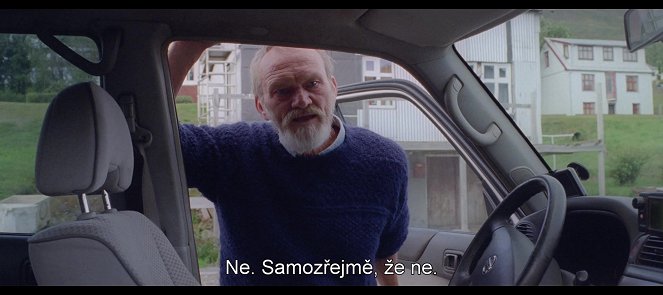Rendező:
Hlynur PálmasonForgatókönyvíró:
Hlynur PálmasonOperatőr:
Maria von HausswolffSzereplők:
Ingvar Sigurðsson, Ída Mekkín Hlynsdóttir, Hilmir Snær Guðnason, Sara Dögg Ásgeirsdóttir, Björn Ingi Hilmarsson, Elma Stefanía Ágústsdóttir (több)Tartalmak(1)
Ingimundur a világtól elzárt izlandi kisváros szélén, lélegzetelállítóan szép hegyek és fjordok között építi házát. A feleségét gyászoló férfi nemrég vonult vissza rendőri szolgálatától. Ingimundurban egyre erősebb a gyanú, hogy feleségének, aki autóbalesetben hunyt el, halála előtt viszonya volt valakivel a városból. Napról napra megszállottabban nyomoz, hogy megtudja az igazságot, és egyre inkább veszélybe sodorja saját jó hírét és lelki épségét. A gyász, a bosszú és a feltétel nélküli szeretet érzései viaskodnak a férfiban, akinek kezd kicsúszni a lába alól a talaj… (CirkoFilm)
(több)Recenziók (6)
Egy izlandi zsaru, apa, nagyapa, és főleg friss özvegyember jellemének tanulmánya, aki rájön az elhunyt feleség titkaira. Nem krimi, de egy erőteljes intim dráma egy életen át tartó, síron túli szerelemről, csalódásról és megbocsátásról. A látszólag egyszerű téma olyan sztorival van megfűszerezve, amelyben a nézőnek magának kell megválaszolnia néhány kérdést, és kreatív forgatókönyv/vágási betétekkel (a nyitókép az izlandi időjárás arcáról, rendőrségi monitorok, zuhanó kő stb.). Plusz kiváló Ingvar Sigurðsson. [Helsinki IFF]
()
A White, White Day is an exceptionally compelling festival slow burner, thanks especially to the raw lyrical involvement of the breathtaking Icelandic countryside, the natural actors and the way Pálmason works with (Scandinavian) crime-film conventions. The film has a detective-movie structure due to the fact that the protagonist applies the modus operandi learned during his police service to address his own suffering. The strive to find and apprehend perpetrators. The problem lies in the fact that no particular person committed the crime that we see in the prologue (at most, Ingimundur himself was an accomplice, if it was a suicide and not an accident). Therefore, the protagonist essentially has to create a perpetrator in order to have something to solve. In the tradition of art cinema, particularly the inner world of the depressed widower is addressed; his disconnection from his own emotions and the world around him is best illustrated by the transformation of his relationship with his eight-year-old granddaughter. He first merely teases her and then scares her with a fictitious story about a stolen liver (which is connected with the key motif of the dead coming back to life, which is “resolved” in the last scene) and finally terrifies her with his own real behaviour. Besides the fine work with motifs (for example, the constant elimination of obstacles, from bloodstains to stones on the path, recalling unaddressed trauma), I also admired the certainty with which Pálmason “builds” long shots of tens of seconds (perhaps even a few minutes) with long segments of dialogue, complex emotions and a lot of action (and possibilities when something could go wrong). A White, White Day is a simple story told in a captivating manner with a tremendous emotional impact. 90%
()
Slow, depressive Icelandic films about sad freaks are already a sub-genre on their own. This one in particular drags a lot, at least at the beginning. On top of that, the main character is an unlikeable grumpy old man with no sympathy for anything or anyone, who repeatedly behaves like idiot to those around him while demanding others should be flawless. And, according to the film, they should understand and sympathise with him. I have the same problem I had with the recent Woman at War, also from Iceland. I like my Icelanders better with their famous black humour. #KVIFF2019
()
Statistically speaking, Iceland produces probably the most movies for a resident in Europe, which moreover can be seen worldwide at different festivals. On one hand it would be thanks to the locations, on the other thanks to the people who generally tend to like arts. The director Hlynur Palmason used both of those aspects to their fullest potential. Long story-telling and shots often create a great movie experience where you are watching, for example, a stone rolling down the hill or a shot of a building from a particular angle throughout all four seasons. Those shots are just beautiful. You are watching a dry land without a tree or just a single leaf, the mist that consumes those pointed rock-hills. I don’t know about you but for me it creates a totally Zen-like atmosphere. Unlike Ingvar Sigurðsson who makes me feel uneasy. Probably thanks to that fact his performance was excellent. His character didn’t speak much and that’s why he spoke through his body and mainly eyes. I’m almost not afraid to call it a new acting style. A great experience that actually is a standard for Iceland. Nevertheless this movie is more about the landscape than the dialogues, and therefore it is necessary to be prepared for that.
()
This originally and poetically recounted Icelandic drama excels through an excellent camera and the performance of Ingvar Sigurðsson in the lead role, combining masculinity and stubbornness with subtle sensitivity. The well-directed and subtle film deals with the psychological transformation of a widower who, while babysitting his granddaughter, drives away his grief by building a family home, and his response to the shock of going through his wife's estate as an unexpected substitute for mourning is silent defiance, followed by a noisy eruption.
()
Slowly, without unnecessary words, peculiarly and at the same time suitably dramatically: it is possibly only Icelanders who can tell stories this way. Much of this is certainly due to the inhospitable environment in which they live. Ingvar Sigurðsson's precise portrayal of the central role, fully concentrating on expressing inner feelings and dilemmas closer, is breathtaking. (70%)
()

